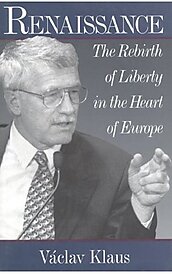Václav Klaus was appointed finance minister of the Czech Republic in 1990, shortly after the demise of that country’s communist government. Two years later he was named prime minister, and in that capacity he has been one of the most effective spokesmen for classical liberal ideas in the world. With the publication of Renaissance: The Rebirth of Liberty in the Heart of Europe, the Cato Institute brings together 29 essays and speeches by Klaus, all of which were originally written or delivered in English.
Renaissance is divided into four sections. The first section, “The Process of Transformation,” includes his essay, “Rebirth of a Region: Central Europe Five Years after the Fall,” which was originally delivered at the Atlantic CEO Institute Conference in Prague in 1994. In it he discusses what he believes were the most important steps toward restoring the rule of law and bringing prosperity to a region that had neither.
“The most important change at the microeconomic level was general privatization,” Klaus says. That was achieved through a system of bids and auctions in which properties were systematically transferred to private hands. “At the macroeconomic level, the task,” he reports, “was to end the paternalism of the state, eliminate all forms of subsidies, keep the state budget in balance, and pursue an independent monetary policy.” Much of that has taken place now, and the Czech Republic, according to Klaus, has made it past “major surgery” and is in the “rehabilitation center.”
How was such radical change possible in such a short time? Klaus answers that question in “Current Challenges and Conservative Solutions.” He says, “We started our Velvet Revolution, our systemic change, our fundamental change of the entire political, social, and economic framework — not a reform, not perestroika — with a clear positive vision of the society we wanted to live in.” Thus, the desire to break with communism completely, not to try to mold it into something improved but fundamentally the same, was the key. Klaus continues, “We learned from Hayek, Popper, and other thinkers that the evolution of human institutions, and especially the evolution of such complex systems as society, proceeds more by means of ‘human action’ than of ‘human design.’ We had no dreams about mixed systems, about third ways or different vintages of perestroika.”
Also included in Renaissance are his views on foreign aid, what monetary systems are consistent with a free and vibrant society, civil liberties, and egalitarianism. Regarding the latter, he says, “We are sometimes accused of forgetting to mention adjectives other than ‘free.’ However, I believe that it is sufficient to guarantee freedom — individual happiness is up to each of us.”
